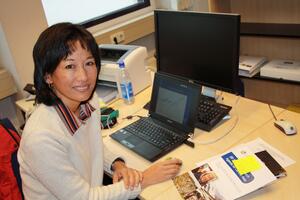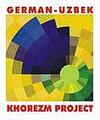“The collaboration with the ZEF/UNESCO project in Uzbekistan has been indispensable for our research in the region”.
Interview with Dr. Laurel Saito from the University of Nevada Reno, U.S.A., guest researcher at ZEF.

Mrs. Saito has a Ph.D. in Civil Engineering from the Colorado State University. Her fields of special competence and experience are, among others, interdisciplinary modeling of aquatic ecosystems, water quality data management and drought analysis and stochastic modeling. Under her leadership, a group of researchers of the University of Nevada has been working in Uzbekistan for the past several years. In this context she has been collaborating with the scientists of the ZEF/UNESCO project in the country.
Dr. Saito, your research group has been working on lakes in Khorezm. What results have proven most striking so far?
Well, we have some interesting findings. First of all, it is amazing that there are so many lakes in this region, which are actually not being used except for some small-scale fishing for domestic use. Our calculations indicate that the lakes are around 80-130 years old. This age seems odd, since this would mean they are not natural because they’re not very old, but they are also not a result of huge scale irrigation management schemes during Soviet times either because then they should only be about 50-60 years old. So we are still puzzling about the age issue of the lakes. Probably, there has been irrigation prior to the Soviet era or perhaps the Amu Darya shifted its course and floodplain in the past.
Which other outcome didn’t you expect?
Well, after all we heard about the environmental damage the irrigation and use of pesticides have been left by the Soviet times and its agricultural system, we had been expecting to find pesticides in the lakes that could be of concern. The lakes, you must know, are mainly filled with water deriving from irrigation. But so far, we have only found very small amounts of pesticides (or none at all) in everything we’ve analyzed. Even analyzing the sediments in the lake bottoms using lake cores hasn’t shown any large amounts of remaining pesticides.
What are your main recommendations for the future use of lakes in Khorezm, Uzbekistan?
We have come to the conclusion that these lakes have a huge potential for aquaculture. Uzbekistan has a tradition of consuming fish and producing fish products when the Aral Sea was still intact. So if we could increase fisheries in the lakes, it would be an environmental and economical interesting option. After all, the lakes seem to be healthy with fishes and plants in them.
Any other ideas?
Well, the lakes seem to be less salty than the groundwater, so the water might be able to be used for irrigation purposes as well.
Has the cooperation with the ZEF/UNESCO project been fruitful for your research group from Nevada University?
It certainly has. First of all, when we started working in Uzbekistan, Uzbek-American relations at the political level were at a low. So without the umbrella of ZEF and in particular UNESCO we probably could never have continued our work. Also, the infrastructure the ZEF-led project offered for researchers in terms of logistics, qualified local staff, facilities such as a laboratory and the network of local partnerships has been unique and key to our research too.
And what about cooperation among the researchers?
Well, our group consists primarily of natural scientists, such as engineers like myself, hydrologists, ecologists, chemists, etc. So the collaboration with social and economic scientists from the ZEF/UNESCO project has proven to be very productive. The social and economic aspects of our research have been complemented by researchers of the ZEF/UNESCO project, which is indeed more interdisciplinary in its set- up and implementation.
What perspectives and plans do you have for future research in Uzbekistan?
We have submitted several funding proposals for continuing our research. We do hope that the NGO “KRASS” will strengthen its funding capacities and can be our collaboration partner in the future. It could thus fulfill the role the ZEF/UNESCO project has played in the past.
Dr. Saito, we thank you for this interview.



